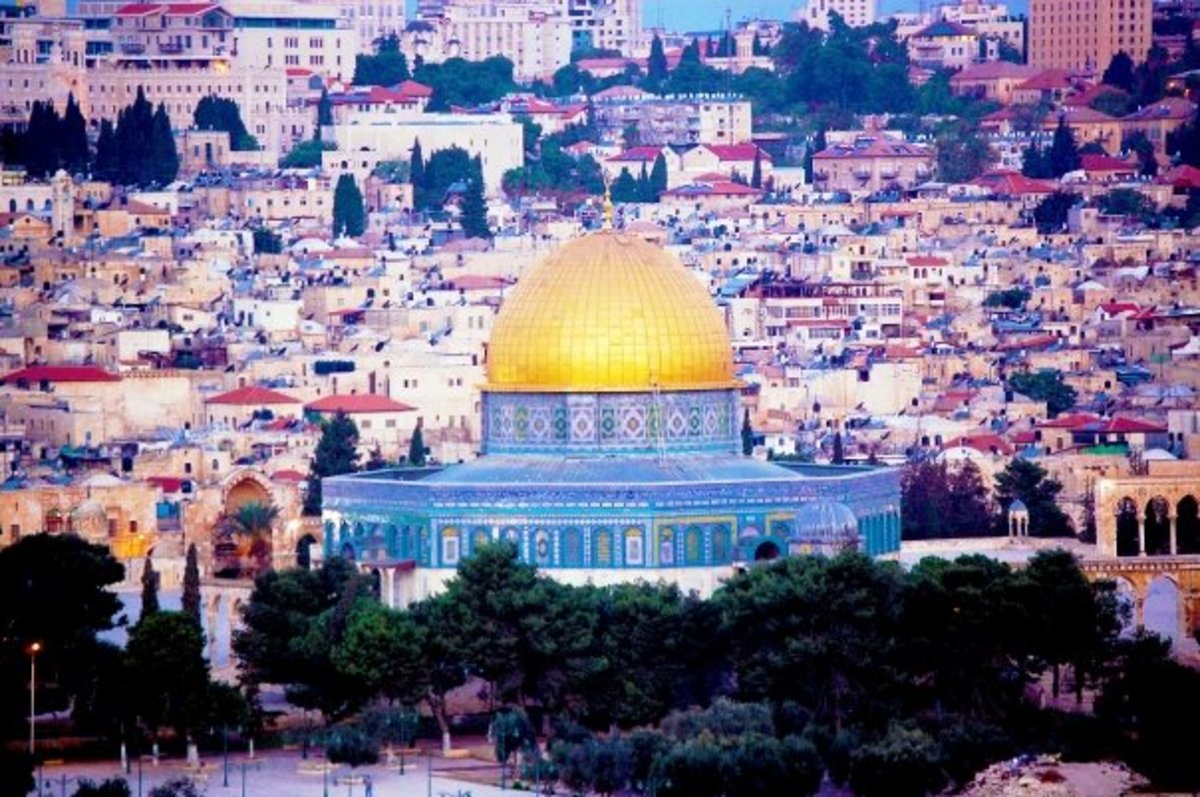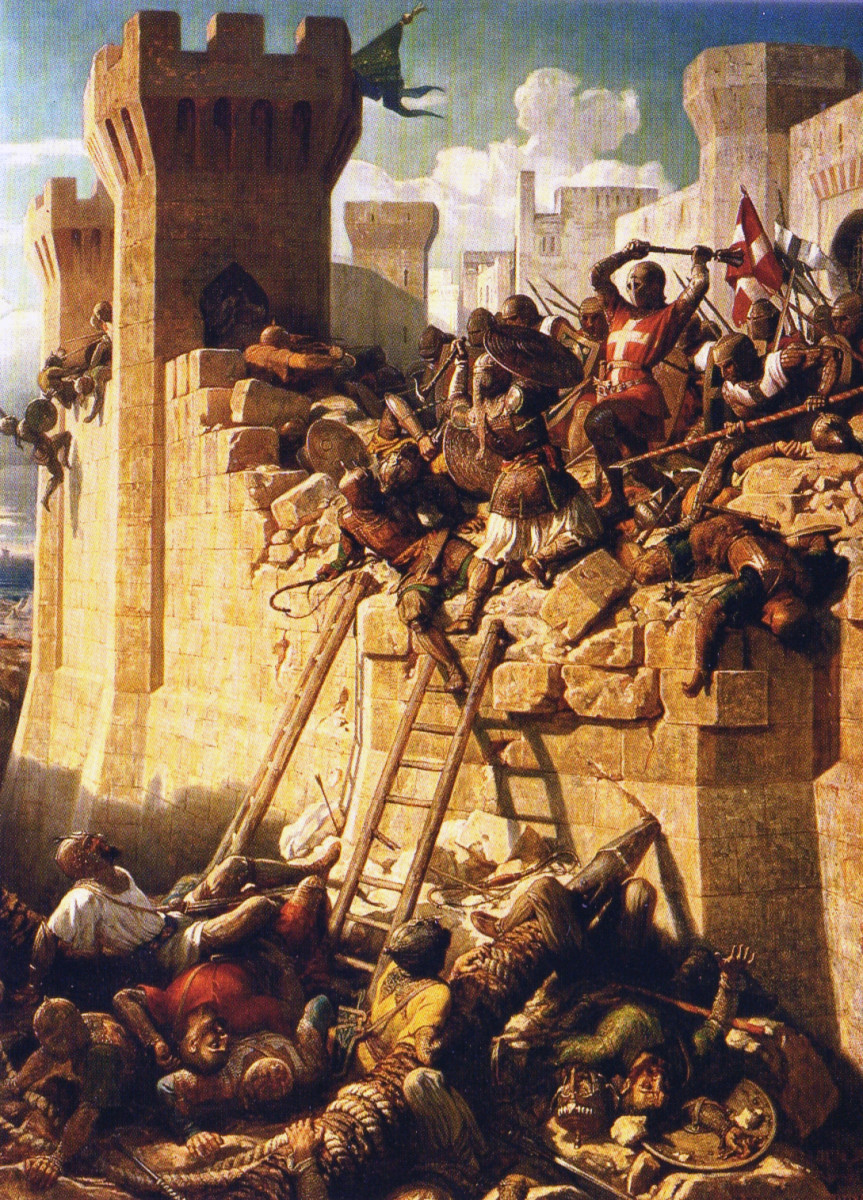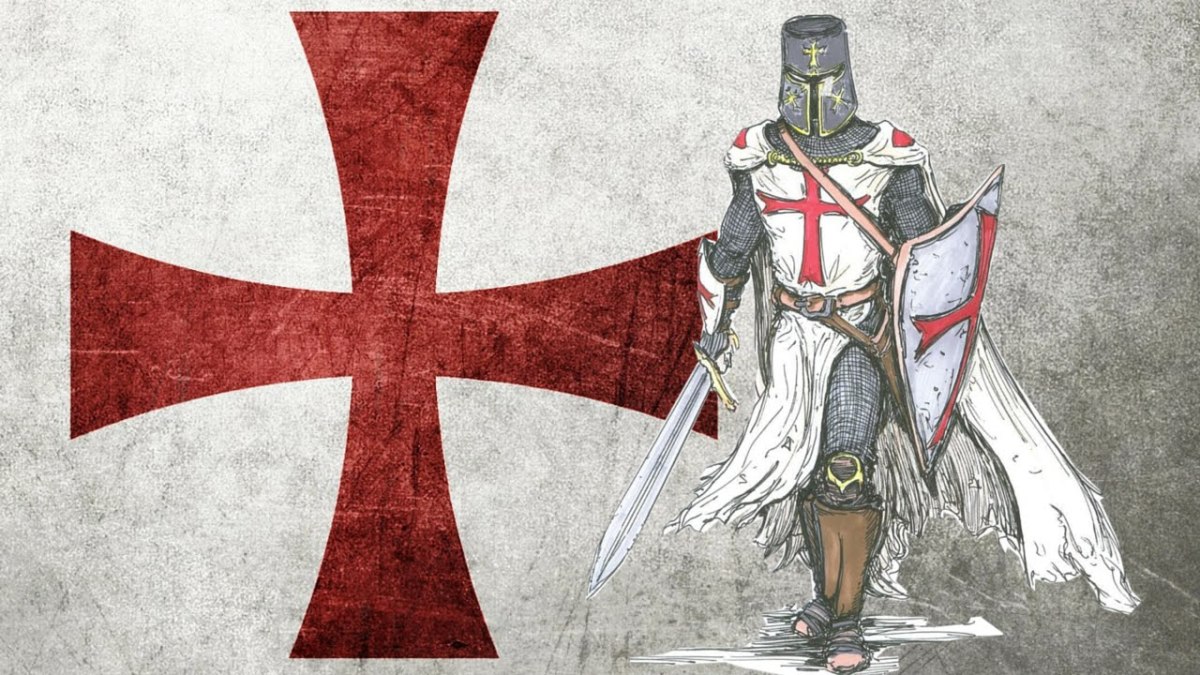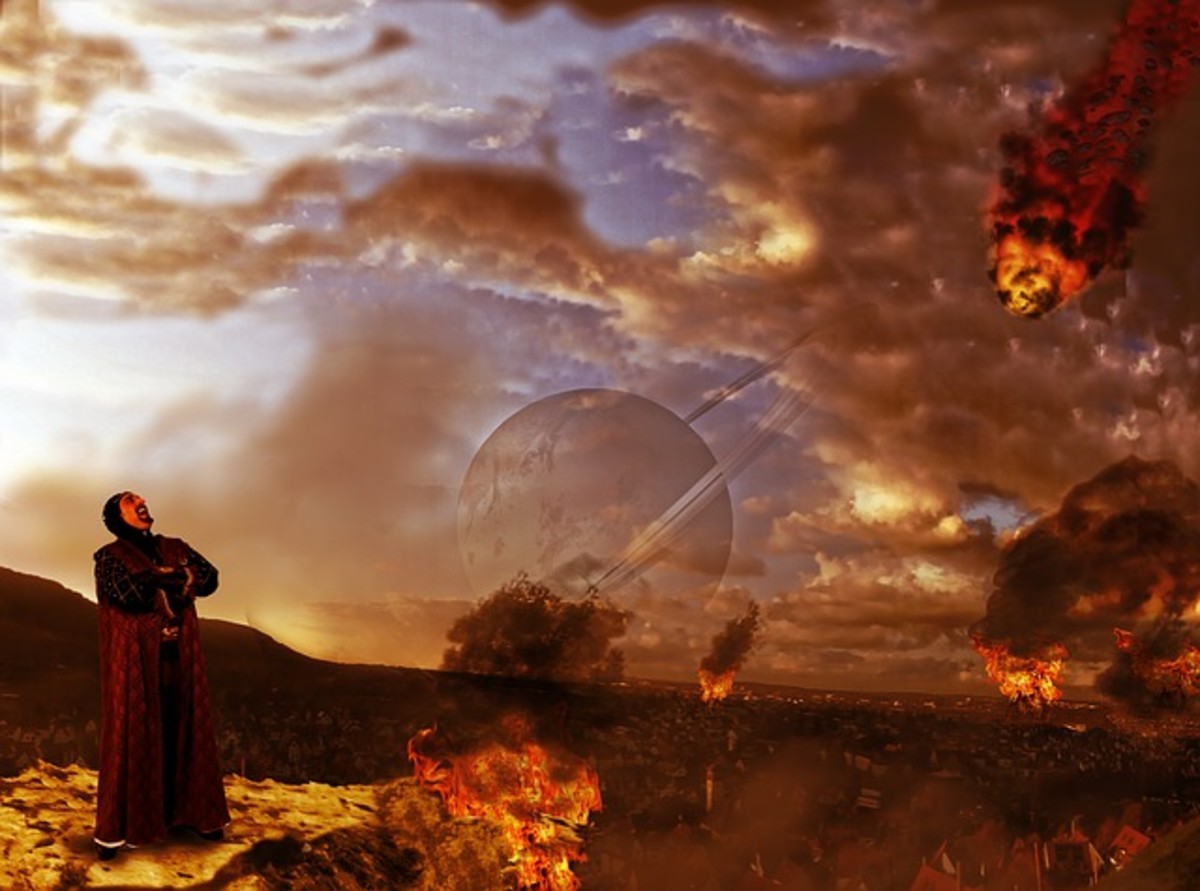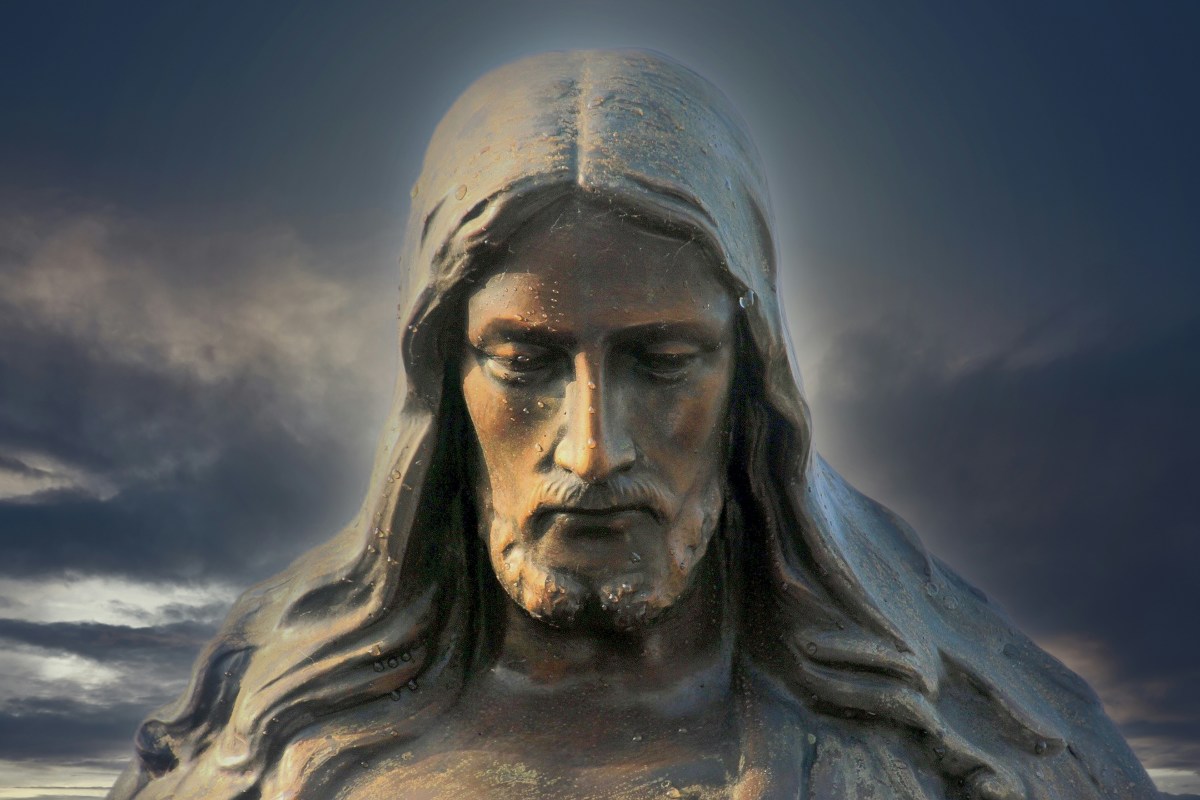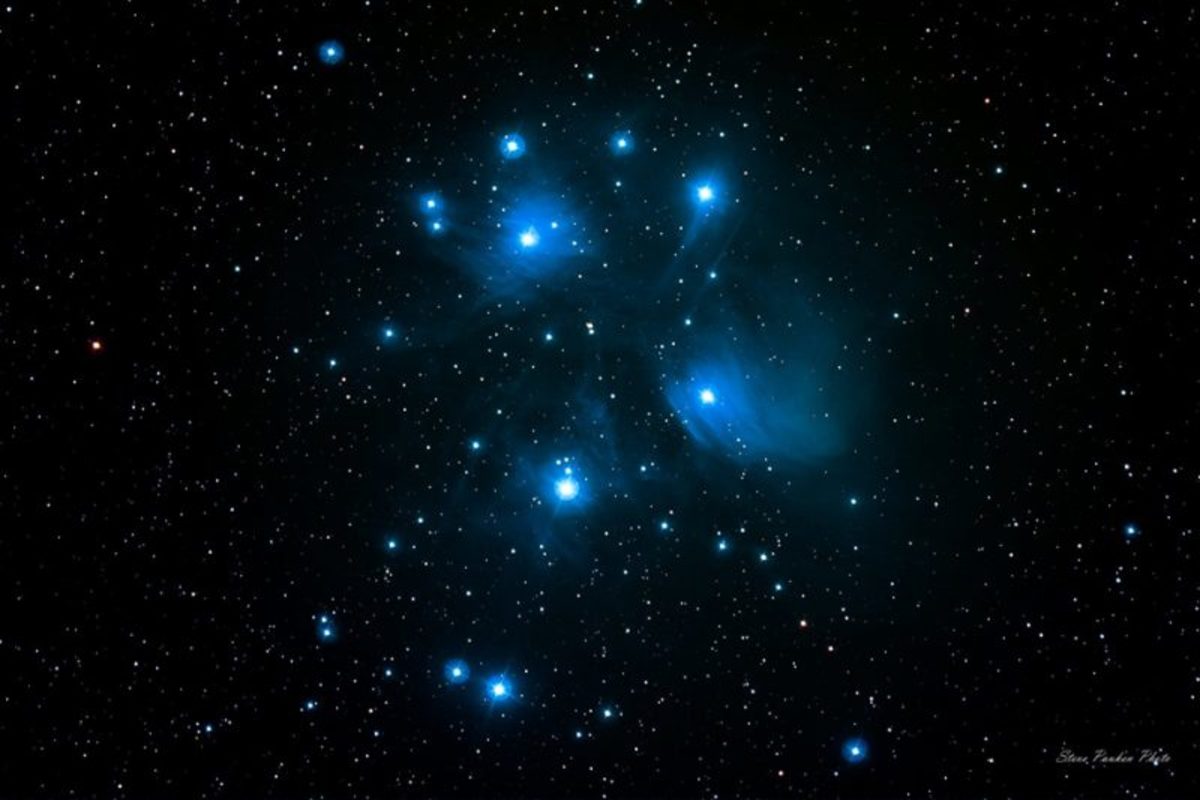Neverending Holy Wars
Battle of Cuarte 1094 for Valencia
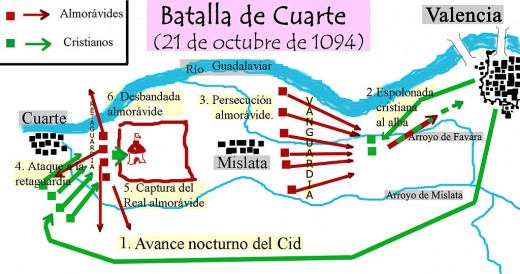
Does God Fight in Wars?
It does not take a post-graduate degree to derive a fairly accurate understanding of human nature from observation alone. All wars are started by people, not God. Usually, they are not just people. They are people who think they are better than people. But they are people, all the same. The Islamic term, Jihad, has begun to undergo wear and tear. Its value has depreciated. In fact, it is practically meaningless, except insofar as it motivates the gullible, exploits believers, and adrenalizes soldiers of fortune, to employ a euphemistic appellation. Jihad is nothing new. It translates easily into every language. The concept of Holy War is embedded somehow in the doctrine of just about every large denomination. The conscientious objector is an exception. The greater mass readily takes up arms, if called upon. Holy War harkens back to pre-monotheistic paganism. The idea that partnerships exist between God and man in doing battle is so old its origin cannot be determined. It is, however, hard to validate. There can be no such thing, unless true cause exists. Who or what makes the ultimate determination?
Obamacare might not have worked in the medical community. But as a militaristic, or rather, anti-militaristic stance, it works quite well. Of course, I am bending the term to my own use. What I mean is that he is, at the moment, correct. America should not be at war with Islam. A few You-Tubes, at present, are exceedingly provocative. In one, a bilingual ISIS leader claims the support of Allah, whom the western world lacks. Thus, he says, he and his masked men will win, we will lose. Whatever. . . . Nevertheless, we do not have to send in troops rightaway in order to shut down what amounts to plain, vapid propaganda. No doubt he sounds authoritative to local ears. To ours, he is inaudible. Inaction is, at present, an example of Military Obamacare: it is, in cases, a proper response. Or, let's say, discretion is the better part of valor. We take care of our own. We are not required to send them into hellfire. We can steadily build up manpower, rather than mindlessly thrust soldiers, as if fully expendable, onto sharpened Jihadi swords. There is still time to improve the U.S. war machine and devise superior strategies.
Young Australian Convert/Spokesperson
Scripture and the History Record
Throughout the years, Zion has gone by many names. It is variously called Israel, Judea, and Palestine. In 135 AD, the Roman Emperor, Hadrian, renamed the capital, formerly Jerusalem, Aelia Capitolina. Later, Muslims renamed it again, Al-Quds. The point is, in the bible, it had to be fought for. It is still being fought for. Some date the Hebrew-Canaan squabble as far back as 1030 BC. The fall of Jericho that preceded it has never achieved full-fledged archeological status. In any case, there have been countless Holy Wars. Nothing was particularly new under the sun, either three thousand years ago, or now. Unfortunately, time does not stand still, like Joshua's motionless sun (Joshua 10:13). It is not long -- say, two hundred years -- before Israel is conquered by Assyria in 722 BC. Figuring out what happens next (the historical text is so filled with action, drama, names, places, incidents, and prophetic commentary) is almost a thankless task. The split between Israel and Judah, the Babylonian Exile, and the emergence of the House of David are all ancient history, when, a thousand years later, six hundred after Christ, Mohammad is born. To gain more perspective, Constantine, the first Roman Emperor to convert to Christianity, rules circa 300 AD. We are now only 400 years away from the initial, bona fide, Christian-Islamic conflicts, which will intensify in the coming centuries. Before Constantine's victory over Maxentius, in effect the eastern portion of the Roman Empire over the western, the New Testament will have been written.
Muslims threaten Jihad, but Popes, simultaneously, speak of Holy War, especially in Spain, where many crusades take place, before, hundreds of years later, the "Moors" are finally expelled. Knights are granted remission of sins. Their Muslim enemies promise much worse for those who "venerate" the cross. It is amazing how long they fight and how far away from home. Later, in the 16th century, Protestant theories of Holy War will chime in. Luther, reacting to pressures on Germany's eastern sector, will use Isaiah and other prophets to justify Holy War. Calvin is more restrained. Puritans cite the warrior spirit of the Old Testament, a perspective that has managed to survive intact to this day. In fact, some modern theologians disregard chronological time. Thus, if Moses, or Joshua, were ordered to take the Promised Land, then it had better be taken, no matter who has died, or been dead, for however long. Not so, according to followers of the Koran. It was lost and now rightfully belongs to Islam, just as much as Mecca and Medina. Although the individual would like not to see such quarrels, beneath the dignity, it would seem, of major religions, regardless of theology, they continue at a fevered pitch, fueled by high-tech gadgetry. Not only do firearms and explosive devices come into play, but, as newscasters frequently point out, cell phones. Used and tossed away, they make it hard to keep track of the movements and machinations of sleeper cells in the First World.
The Spanish regarded their own crusades as important as those taking place in the Holy Land. Rather than think of themselves as cursed, they felt afflicted, being tried in the fire, or tested, and were willing to offer resistance in the form of martyrdom, suffering, and sacrifice. According to a study of the Reconquista, only the clergy could proclaim a Holy War, which they did, declaring from the pulpit that "When a war is undertaken at God's direction one cannot doubt that it is rightly undertaken." (Reconquest and Crusade in Medieval Spain, 2003) Thus, war itself, especially for the sake of carnage and looting, was never acceptable, explained well enough by Matthew 26:52. Papal Bulls, humble vows, and the symbolic wearing of crosses helped put into motion a tremendous endeavor involving money, supplies, weapons, horses, and lives. One could atone for sins by going to Spain. Henry II, after the murder of Thomas à Becket, had such an opportunity, though he declined. The battles in Lisbon indicate just how far northwest Muslims were entrenched. Their lack of respect for Christianity also enhances the fact, if obvious, that these militant actions were primarily of a religious nature.
1948 Defense of Old Jerusalem
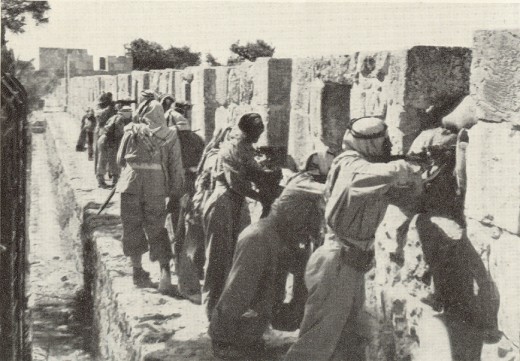
What Price Jerusalem?
This is certainly an interesting question since the only viable answer is that it is priceless. Nevertheless, strategies to hold onto it, whatever they might be, directly oppose Jihadists, who go to great extremes. They travel everywhere but Jerusalem. It does not require much to infer from the way they spread out that they mean to either conquer or influence the global environment. They are encouraged by the fact that most nations employ only half-measures to combat a rather ambitious project. Jihadists hope to pressure foreigners to at least withdraw support from Israel, the final destination. Thus far, results are mixed. They are far from their goal, but do not lack for zeal. Time is not really on their side, though. Worse, they face great obstacles in the future. In general, the world has reacted slowly, but at the very least, with a new administration looming on the American horizon, chances are terrorists will soon undergo increasing setbacks. Needless to point out, Israelis live in Israel, the same as the Spanish in Spain, which was then occupied by uninvited, unfriendly Muslims. Perhaps a few lessons can be learned from past clashes between Spanish Christians and Muslims.
Spain seems particularly apt since it had an extremely long, drawn-out fight, as religious- as war-minded. Maps from the 11th century indicate that caliphates once controlled the majority of Spanish land. From Granada in the south to Toledo, further north, and as far west as Lisbon. Barcelona, to the east, was barely within Christian territory. Make no mistake, these regions were taken by force, maintained as such, and liberated only after an agonizing series of campaigns, many of which ended in failure. How much failure can be glimpsed by The Order of the Holy Trinity. Its chief occupation was to negotiate ransoms. Christians were routinely captured, then just as now. The Umayyad Caliphate, headquartered in Damascus, was also headquartered-in-exile, according to Wikipedia -- sometimes right, sometimes not -- in Córdoba. Eventually, Spain conquered its intruder, as Ferdinand and Isabella ascended the throne.
Mosque in Cordoba, Spain

The Limitations of Fanaticism
Examples might be used to reenforce the notion that Americans hold dear a different, more complicated, less ethnocentric ideal. We cannot compare ourselves to Medieval Spain. At the moment our sense of tolerance has stymied efforts or lack thereof to engage whole-heartedly in what amounts to an Us Versus Them Holy War. The President is always saying, "That's not who we are." So, who are we? Actually, we can safely assert, few want such a confrontation. The website, trueIslam.com, affiliated with the USA, expresses major divergences from the belligerent clericism of the Middle East, and neighboring, unstable areas. Terrorists have certain ideological tasks ahead of them, apart from violent acts. They must weaken our resolve, and, as has been the case, many, many times before, make a mockery of values that distinguish us from other, more narrowly focused nations. Conversely, as much as we react with nausea and disgust to the subhuman events that terrorism churns out, we must somehow apply a surgical knife. To date, America has not shown (and probably wouldn't) how it intends to fight terrorism, so that the equation, Islam = Terror, does not abide.
"Extremism in the defense of liberty is no vice. And moderation in the pursuit of justice is no virtue." These words, spoken by Barry Goldwater, are relevant to the discussion at hand. (http://www.brainyquote.com/search_results.html?q=Barry+Goldwater). Obama is right. America is not at war with Islam. Nevertheless, our worst enemies are currently in the fold, though they have managed to attract many non-Islamic converts. The brainwashed are mostly young and impressionable. The conversion to violence, somehow adapted to the practice of Islam, has been accomplished, in part, by the internet. Having done so brings up the role of progress or modernization in creating a rift that will not mend. It is not just America but the West as a whole that radical Islam both hates and dreads. Its only remedy, with hardly a shred of change from the 8th century, is to kill and convert. Once converted, the hapless victim, if it comes to this, eventually learns that his or her fate is in the hands of captors masquerading in the guise of holiness. The last twelve or thirteen centuries, in terms of invention, enlightenment, revolutions, progress, or humanitarianism, mean nothing to them. Thus, the fight, such as it is, and will be, has come to us, unsolicited, and already a heavy burden.
Fortified Mosque in Léon, Spain
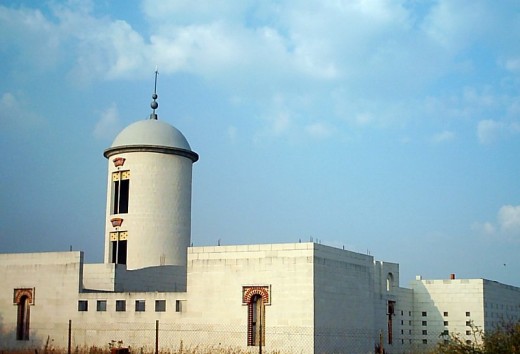
Whose Lives Matter?
It is an unfortunate piece of timing in that I am writing this article during the aftermath of the Bastille Day attack in Nice. We have heard how Black Lives Matter in addition to Blue Lives. But we have not taken to the streets in support of French Lives. Apparently, without a choice, they are at the front line of a new phase of Holy War that has quickly sprawled all over. It was hard enough for me, unschooled in European history, to pick up on five hundred years of Spanish grief, in its effort to evict hostile Muslims, and prevent them from taking over. French involvement in the Christian-Islam conflict, and a reflection of it in current, tragic events, are beyond my comprehension. France is predominantly a Catholic country, though it is rarely seen as religious. In fact, in the recent past, it has served as a significant asylum and haven for Muslims, including Ayatollah Khomeini, as well as the Third World. Nevertheless, it is also a powerful, post-colonial presence in the Middle East, and, hence, a target for radicals.
The History of the Church is yet another subject I am unfamiliar with. Various Popes gave their approbation to Spain, separate and distinct from crusading in the Levant. The Spanish Crusades are filled with mystical visions of St. James, St. George, and other angelic apparitions in the sky, white as snow. They prayed earnestly for victory. Say what you will, they fought hard and long. If it were not for their perseverance and martyrdom, one can only imagine what would have happened. It was one thing for Mohammad to fight pagans and reach accords with Christians and Jews. It was another, later, without Mohammad, to invade established Christian nations. The "discovery" of the New World is thought to have defused the entire situation. At that point, aggressive Christians preferred to convert "Indians", and, of course, harvest gold, whenever possible. Losing Spain must have been a terrible disappointment to aspiring Muslim hopes and dreams. But they proved resilient in the Maghreb, holding onto West Africa, below the Iberian Peninsula, after over a century of further armed conflict. Today, it goes without saying, Muslims are not to be underestimated when it comes to improvising surprise attacks of the most heinous kind. Their continued presence on the African continent also cannot be safely ignored.
Christian - Muslim Tension
Should We Live Together or Apart?
1492: Expulsions and Glory

Victory
Spain won its independence from the intolerable meddling of egotistic Muslims. It could then build and repair churches and not worry about crosses and statues being pelted with stones and epithets. Those who supported the notion that God determines the outcomes of battles saw Spain's victory as an affirmation of faith in Jesus Christ. The reverse, the losses and defeats, were seen as punishment for transgressions and sinfulness. On the surface, especially today, this does not seem credible. But Spaniards who fought over the course of several centuries could not have done so without the sustenance of faith. The purpose here is only to point out the difficulties involved then, which might serve to instruct our own day and age. El Cid was able to deal with both Muslims and Christians, somehow holding them together. To be sure, prior to the outbreak of war, both sides did in fact intermingle in rather close quarters. Perhaps there are those today who think they have the same leadership and inspirational qualities. But El Cid was probably the best exception. From today's headlines, anyway, (July 15), it does not appear as though the Muslim world view has any opening available for a single Christian. To Islam, it is only a matter of time. For us, solutions remain so out of reach and futuristic as to compete with science fiction. Will they ever come into existence? Or will we forever be at odds with one another, Muslim and Christian, until the end of time?

